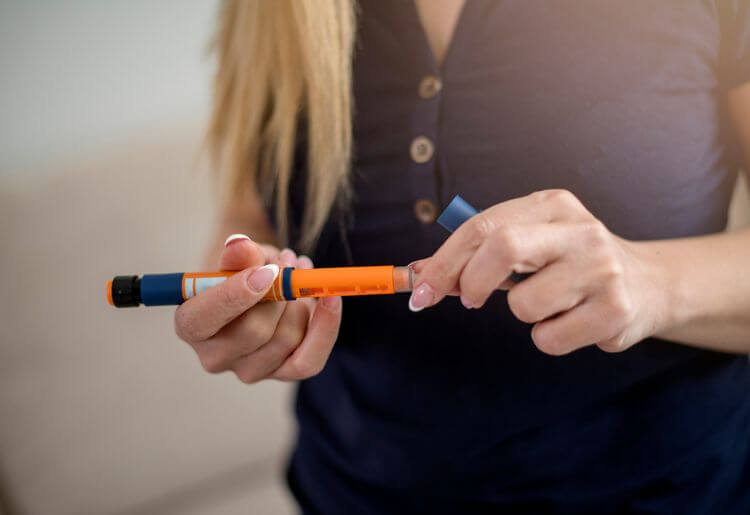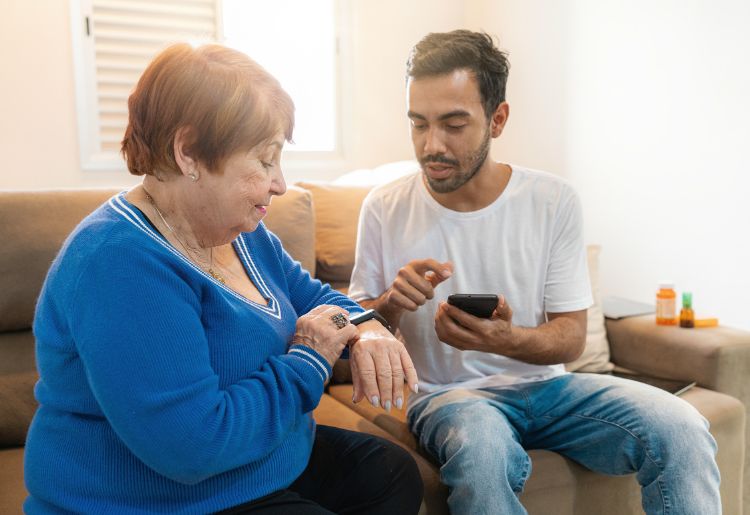- Home/
- Medical Alerts/
- Allergy Safety: How Medical Alerts Help
Allergy Safety: How Medical Alerts Help
November 9, 2023

November 9, 2023

Fortunately, you can take a simple precaution to avoid this situation—invest in a medical alert device. These can be as sophisticated as the ones we reviewed in our Top 10 Best Medical Alert Systems & Companies or as low-tech as a simple medical ID bracelet. Check out the reviews for our picks of the best medical alert bracelets in 2026.
If you have allergies and have been thinking about getting a medical ID bracelet or emergency alert device, these facts will help you make a more informed decision.

Allergies happen when your body’s immune system mistakes a harmless substance for a dangerous one and overreacts to it. Minor allergy symptoms include sneezing, itchy eyes, and skin rashes, but if you are severely allergic to a substance, contact with it can trigger anaphylaxis.
When this happens, your blood pressure drops, and your airways constrict, so you can’t breathe properly. An anaphylaxis attack can cause you to go into shock, lose consciousness, and even threaten your life if not treated quickly.
One study reports that up to 5% of the population in the United States has suffered anaphylaxis. Improvements in treatment have resulted in fewer fatalities, but they still number in the hundreds worldwide every year.
The reason for these deaths is usually that emergency medical personnel were unaware of the patient's allergies and thus didn’t treat them or that the patient was allergic to medications used to treat them, which proved fatal.
There’s an enormous range of substances that people can be dangerously allergic to. A few common causes of anaphylaxis include:
If you suffer from food allergies and are careful about the ingredients in your meals, consider using one of the many food delivery services that offer lactose-, nut-, and egg-free options. These can cater to your dietary requirements, giving you peace of mind.
The most significant factor that determines your risk of anaphylaxis is if you’ve gone into allergic shock before. Your risk of a dangerous reaction increases with each attack. Additionally, you’re at higher risk of anaphylaxis if you have a family history of it, asthma, or certain other conditions such as heart disease.
The Asthma and Allergy Foundation of America states that as many as one in 50 Americans are at risk of having a severe allergic reaction. About 25 million have asthma, resulting in 1.8 million visits to the ER and 180,000 hospitalizations yearly.
Another 32 million have severe food allergies, leading to 30,000 ER visits, 2,000 hospitalizations, and 150 deaths annually. Millions of others have life-threatening allergies to insect stings, medications, and latex.
Fortunately, many of these people have had their allergies diagnosed and can protect themselves by avoiding substances that cause a reaction. People with severe allergies tend to carry an EpiPen, an injection that administers a dose of epinephrine, the first-line treatment for anaphylaxis.
However, even if you take these precautions, what happens if you have an anaphylactic attack so serious that you can’t tell the EMTs to use your EpiPen? This is where medical alerts for allergies come in.

As with any potentially life-threatening condition, the most important factors in overcoming anaphylaxis are time and proper treatment. The first is obvious—the faster emergency services can reach you and evaluate your condition, the better your chances of survival. This is one reason that many people with allergies choose medical alert devices that let them call for help by pushing a ‘Help’ button.
However, a simple medical ID bracelet can be just as effective. It tells EMTs (emergency medical technicians) you might be having an allergic reaction that requires immediate treatment. The first-line treatment for anaphylaxis is usually a shot of epinephrine administered from an EpiPen or similar device.
Medical alert bracelets speak for you when you can’t. If an attack leaves you unconscious or so groggy you can’t communicate with EMTs, the bracelet tells them you’re allergic to certain drugs and medications.
Medical IDs are especially useful as bracelets because the first thing an EMT will do, according to the Journal of Emergency Services, is take your “baseline vital signs [which] can provide an understanding of the patient’s condition and will also set the standards upon which all future vital signs will be compared too.” If they find an allergy bracelet on your wrist, they’ll have information that could save your life. They also have access to your emergency contact information.
One important thing to remember if you’re considering a medical alert bracelet is that they work equally well to protect you in situations other than anaphylactic attacks. If you’re involved in a car accident and are unconscious, an ID bracelet lets first responders know that you’re allergic to certain drugs or have a condition like epilepsy or high blood pressure.
They also let healthcare providers know if you have a unique condition that may impact how they treat you, such as an allergy to anesthesia. The Canadian Anaesthesiologists Society states that this rare allergy only affects one in 5,000 to 25,000 cases, but if you’re unconscious or unable to speak and need emergency surgery, this information could save your life.
Parents whose children have asthma or allergies can use medical alert bracelets to protect them. According to the Asthma and Allergy Foundation of America, 40% of children in the US live with allergies. As a parent, you may not always be around to provide your kid’s medical information if they have an attack or some other accident that requires medical care.
Any illness or medical condition that could cause an emergency and leave you unable to speak is a reason to get an ID bracelet. It’s a good idea to wear some kind of medical ID. Some of the most common conditions that call for this are:
Heart conditions
Diabetes
Epilepsy
Asthma
ADHD/ADD
Dementia
Autism

Both solutions can protect you if you suffer from allergies. But medical alert ID bracelets provide critical health information, while electronic alert systems and medical alert safety buttons send for help.
Medical IDs are valuable in any emergency, but they only provide your health information to carers once emergency personnel have arrived. On the other hand, medical alert systems like Medical Guardian or Mobile Help allow you to contact a 24-hour emergency call center that can immediately send emergency services to your location.
They can even make sure that EMTs have all your health information before arriving so they’re prepared. Operators at the call centers can even contact a family member or emergency contact for you.
There’s a strong case for how beneficial a medical ID bracelet can be if you have allergies and suffer an attack. But one of the most important benefits has to be peace of mind.
Knowing that you don’t have to worry about communicating your health information to caregivers in an emergency means that you have one less thing to worry about. This knowledge gives many people greater confidence to live more freely.
Medical IDs are light, unobtrusive, and can literally save your life. They come in many different styles and features, so you can pick the one that best fits your lifestyle.
The least expensive options are simple medical alert bracelets. Some are available in fashionable styles that look more like jewelry than medical alert IDs. Electronic medical alert systems are more expensive, but they offer the important feature of being able to call for help by simply pushing a button.
No matter which type of medical alert system you choose, know that with one, you’re more likely to get the help you need when you need it.
Juliette Siegfried is a biomedical writer, editor, and translator with over 30 years of experience. After working as a health communications specialist for the National Institutes of Health in Bethesda, Maryland, and its contractors, Juliette established ServingMed.com, a medical communications business for hospitals, universities, research foundations, and individual healthcare professionals.